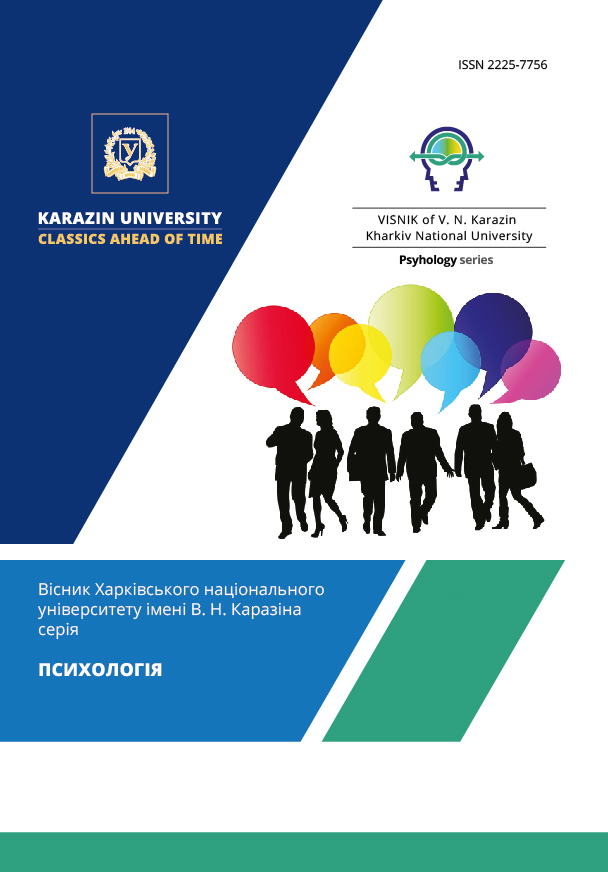TRANSGENERATIONAL MODELS OF MARRIAGE: EXPERIENCE WITH GENOGRAMS
Abstract
Our experiment included 72 genograms of women aged 27-34, who participated in the practical course aimed at work with generic scenarios. We analyzed women`s genograms and identified transgenerational models of marriage.
Transgenerational models of marriage can be reflected in each of 3-4 generations or have some influence through generation. It should be noted that transgenerational models of marriage have the following characteristics: the structure of marriage (family hierarchy, distribution of family roles), stages of family development (divorce, move, giving birth, remarriage), the level of satisfaction with the marriage.
We identified 4 transgenerational models of marriage that were frequently seen in the study sample.
The 1st model “Patriarchal marriage” (14 genograms) is characterized by a significant role of a father and/or a grandfather, idealized and seen as a desired image of a man. The studied women with this family model showed some discontent with their husbands because they do not meet the expectations.
The 2nd model “Matriarchal marriage” (14 genograms) is connected with strong female images (grandmother and/or great-grandmother), who were forced to take primary responsibility for the family because the man was a weak figure: he might have drunk, been sick, cheated, had problems with the law. Such relationships are very consistently reproduced in the families of female descendants.
The 3rd model “Serial monogamy” (10 genograms) is characterized by the common features of two marriages from previous generations. Most often the 1st of them is described as unconscious and early, and the 2nd marriage as a more successful one. One of the options is that there are children in one marriage, and the other couple has problems with fertility.
The 4th model “Misalliance” is an alliance of people with a consciously different social, educational and material status. The fact of the partners’ inconsistencies is emphasized and passed as a family mythology. This misalliance is reproduced in the generations of the descendants.
Recommendations are offered for marital psychotherapy, taking into account the influence of the transgenerational model of marriage on the interactions of couples.
Downloads
References
Литвиненко С. А. Психологія травми: трансгенераційний та феноменологічний аспекти. Психологія: реальність і перспективи // Литвиненко С. А. , Ямницкий В. М. / Збірник наукових праць РДГУ.- 2015.- Вип. 4., С.14-17. http://repository.rshu.edu.ua/id/eprint/1001/1/%D0%9B%D0%B8%D1%82%D0%B2%D0%B8%D0%BD%D0%B5%D0%BD%D0%BA%D0%BE%20%D0%A1.%D0%90.%2C%20%D0%AF%D0%BC%D0%BD%D0%B8%D1%86%D1%8C%D0%BA%D0%B8%D0%B9%20%D0%92.%D0%9C..pdf
Сазонова О. В. Сімейні цінності та рольові установки подружніх пар // Сазонова О. В. / Збірник наукових праць К-ПНУ імені Івана Огієнка, Інституту психології імені Г.С. Костюка НАПН України / Проблеми сучасної психології. - 2018. - Вип. 39 DOI: https://doi.org/10.32626/2227-6246.2018-39.272-295.
Стюарт Я. Современный трансактный анализ // Стюарт Я., Джойнс В. / СПб.: Социально-психологический центр, 1996. – 330с. https://bookap.info/book/styuart_sovremennyy_tranzaktnyy_analiz_1996/
Теория семейных систем Мюррея Боуэна: Основные понятия, методы и клиническая практика / под ред. Бейкер К., Варги А. Я.. – М.: Когито-Центр, 2012. – 496 с. https://mybook.ru/author/sbornik-statej/teoriya-semejnyh-sistem-myurreya-bouena-osnovnye-p/
Терещенко Н.М. Вплив сімейних сценаріїв на формування синдрому «емоційного холоду» в міжособистісних стосунках// Терещенко Н. М., Долгополова О. В. /Вісник Харківського національного університету імені В.Н. Каразіна. Серія: Психологія. Харків: ХНУ.– 2019. - Вип.66. – С. 81-85. https://doi.org/10.26565/2225-7756-2019-66-14
Шутценбергер А.А. Синдром предков. Трансгенерационные связи, семейные тайны, синдром годовщины, передача травм и практическое использование геносоциограммы // Шутценбергер А.А. – М.: Издательство института психотерапии, 2001. - 231 с. doi: 12.60-77.10.1080/15551024.2017.1251185
Felsen I. Adult-Onset Trauma and Intergenerational Transmission: Integrating Empirical Data and Psychoanalytic Theory. Psychoanalysis, Self and Context [Електронний ресурс] / Felsen, Irit. – 2017 –. 12. 60-77. – Режим доступу до ресурсу: 10.1080/15551024.2017.1251185.
Kradin R. The family myth: its deconstruction and replacement with a balanced humanized narrative [Електронний ресурс] / Kradin R. – 2009. – Режим доступу до ресурсу: doi: 10.1111/j.1468-5922.2009.01771.x.
Kocharyan A.S. Personal determinants of life style: psychological valeology / Kocharyan A.S., Barinova N.V., Zubenko O.M. // Psychological Counseling and Psychotherapy. - Issue 1 Vol.8. – 2017. – P. 6-15 doi.org/10.26565/2410-1249-2017-8-05 [in Russian]
Laxenaire M. En souvenir d’Anne Ancelin Schützenberger. Revue de psychothérapie psychanalytique de groupe [Електронний ресурс] / Laxenaire, Michel. - 2019 - . n73. 7. - Режим доступу до ресурсу: 10.3917/rppg.073.0007.
Mellody P. The Intimacy Factor: The Ground Rules for Overcoming the Obstacles to Truth, Respect, and Lasting Love / Pia Mellody , Lawrence S. Freundlich . – Indonesia: Harper Collins, 2009. – 240 p. https://www.amazon.com/Intimacy-Factor-Overcoming-Obstacles-Respect/dp/0060095806
Petric D. Transgenerational abuse and transgenerational trauma. [Електронний ресурс] / Petric D. – Preprint (PDF Available) – 2019. - Режим доступу до ресурсу. DOI: 10.13140/RG.2.2.21749.52961
Transgenerational Trauma and Therapy: The Transgenerational Atmosphere [Електронний ресурс] / Bakó, Tihamér & Zana, Katalin. – 2020. – Режим доступу до ресурсу: 10.4324/9781003015840.
Yiassemides A. Time and timelessness: Temporality in the theory of Carl Jung. Time and Timelessness: Temporality in the theory of Carl Jung.[Електронний ресурс] / Yiassemides, A. – 2013. – Режим доступу до ресурсу : 1-125. 10.4324/9780203070994.




